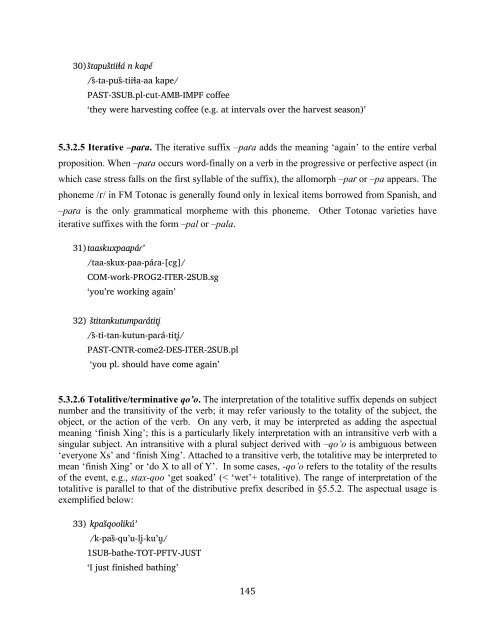The phonology and morphology of Filomeno Mata Totonac
The phonology and morphology of Filomeno Mata Totonac
The phonology and morphology of Filomeno Mata Totonac
Create successful ePaper yourself
Turn your PDF publications into a flip-book with our unique Google optimized e-Paper software.
30) s%tapus%tii"á n kapé<br />
/s"-ta-pus"-tii#a-aa kape/<br />
PAST-3SUB.pl-cut-AMB-IMPF c<strong>of</strong>fee<br />
‘they were harvesting c<strong>of</strong>fee (e.g. at intervals over the harvest season)’<br />
5.3.2.5 Iterative –pa!a. <strong>The</strong> iterative suffix –pa!a adds the meaning ‘again’ to the entire verbal<br />
proposition. When –pa!a occurs word-finally on a verb in the progressive or perfective aspect (in<br />
which case stress falls on the first syllable <strong>of</strong> the suffix), the allomorph –pa! or –pa appears. <strong>The</strong><br />
phoneme /$/ in FM <strong>Totonac</strong> is generally found only in lexical items borrowed from Spanish, <strong>and</strong><br />
–pa!a is the only grammatical morpheme with this phoneme. Other <strong>Totonac</strong> varieties have<br />
iterative suffixes with the form –pal or –pala.<br />
31) taaskuxpaapá!’<br />
/taa-skux-paa-pá$a-[cg]/<br />
COM-work-PROG2-ITER-2SUB.sg<br />
‘you’re working again’<br />
32) s%titankutumpa!átiti&<br />
/s"-ti-tan-kutun-pa$á-titi&/<br />
PAST-CNTR-come2-DES-ITER-2SUB.pl<br />
‘you pl. should have come again’<br />
5.3.2.6 Totalitive/terminative qo’o. <strong>The</strong> interpretation <strong>of</strong> the totalitive suffix depends on subject<br />
number <strong>and</strong> the transitivity <strong>of</strong> the verb; it may refer variously to the totality <strong>of</strong> the subject, the<br />
object, or the action <strong>of</strong> the verb. On any verb, it may be interpreted as adding the aspectual<br />
meaning ‘finish Xing’; this is a particularly likely interpretation with an intransitive verb with a<br />
singular subject. An intransitive with a plural subject derived with –qo’o is ambiguous between<br />
‘everyone Xs’ <strong>and</strong> ‘finish Xing’. Attached to a transitive verb, the totalitive may be interpreted to<br />
mean ‘finish Xing’ or ‘do X to all <strong>of</strong> Y’. In some cases, -qo’o refers to the totality <strong>of</strong> the results<br />
<strong>of</strong> the event, e.g., stax-qoo ‘get soaked’ (< ‘wet’+ totalitive). <strong>The</strong> range <strong>of</strong> interpretation <strong>of</strong> the<br />
totalitive is parallel to that <strong>of</strong> the distributive prefix described in §5.5.2. <strong>The</strong> aspectual usage is<br />
exemplified below:<br />
33) kpas%qoolikú’<br />
/k-pas"-qu’u-li&-ku’u&/<br />
1SUB-bathe-TOT-PFTV-JUST<br />
‘I just finished bathing’<br />
! "()!

















